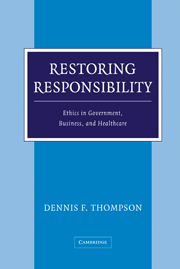Book contents
- Frontmatter
- Contents
- Acknowledgments
- Restoring Responsibility
- Introduction: The Need for Institutional Responsibility
- PART I DEMANDS OF INSTITUTIONAL POLITICS
- 1 The Problem of Many Hands
- 2 The Responsibility of Advisers
- 3 Bureaucracy and Democracy
- 4 Judicial Responsibility
- 5 Representatives in the Welfare State
- PART II VARIETIES OF INSTITUTIONAL FAILURE
- Part III EXTENSIONS OF INSTITUTIONAL RESPONSIBILITY
- Credits
- Index
2 - The Responsibility of Advisers
Published online by Cambridge University Press: 29 January 2010
- Frontmatter
- Contents
- Acknowledgments
- Restoring Responsibility
- Introduction: The Need for Institutional Responsibility
- PART I DEMANDS OF INSTITUTIONAL POLITICS
- 1 The Problem of Many Hands
- 2 The Responsibility of Advisers
- 3 Bureaucracy and Democracy
- 4 Judicial Responsibility
- 5 Representatives in the Welfare State
- PART II VARIETIES OF INSTITUTIONAL FAILURE
- Part III EXTENSIONS OF INSTITUTIONAL RESPONSIBILITY
- Credits
- Index
Summary
In other times and other places, counselors often bore the responsibility for the consequences of their rulers' decisions – and with a vengeance. When for whatever reason the decisions of the Chinese emperors went awry, their ministers, it is said, could expect to have their hearts cut open, their feet cut off, or to be pickled in brine. Today, advisers to government officials have less cause to worry. Rather than strict liability for the advice they give, advisers are commonly assumed to have no responsibility at all for the consequences of decisions made on the basis of their advice. If any one is to blame when decisions turn out badly, it is usually the official who made the decision, not the adviser who counseled the official (unless of course the adviser deceives the official or otherwise acts wrongly in ways the official could not be expected to take into account).
I want to criticize the three most important claims that are put forward to absolve advisers of specifically moral responsibility: the first refers to causal criteria; the second, to the concept of intention; and the third, to role. Each claim in effect takes one feature of the relationship between advisers and the people they advise and turns it into the exclusive test for responsibility. None of these shortcuts will do, although each, substantially modified, may contribute something to a full account of the responsibility of advisers.
I concentrate on only one kind of adviser since I suspect that any general theory of responsibility for advice will have to be constructed piecemeal from analyses of various particular kinds of advising.
- Type
- Chapter
- Information
- Restoring ResponsibilityEthics in Government, Business, and Healthcare, pp. 33 - 49Publisher: Cambridge University PressPrint publication year: 2004
- 1
- Cited by



